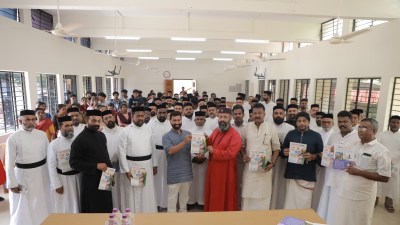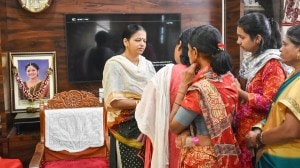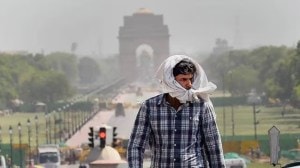- India
- International
Odisha: An ex-Maoist juggles social science, math
In southern Odisha’s remote Malkangiri district, Budra and around 25 other former Left Wing Extremists (LWEs) sat for the second part of their entrance exam for the Bachelor Preparatory Programme (BPP) of Indira Gandhi National Open University (IGNOU) on June 21.
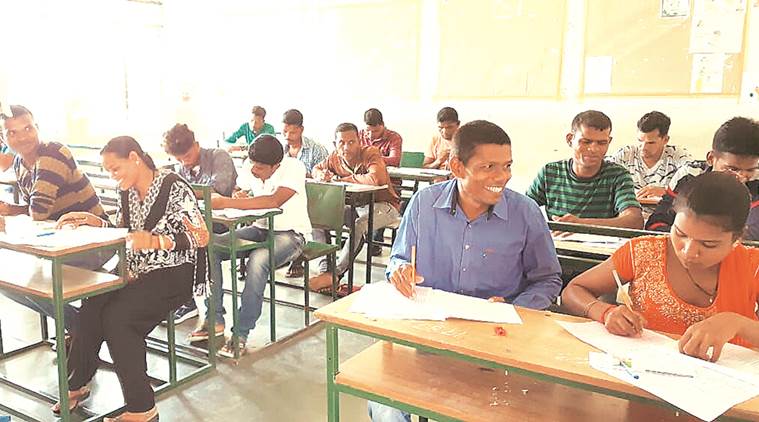 In Odisha’s Malkangiri district, Budra and around 25 other former Maoists appearing for an entrance exam for a bachelor’s programme. (Express photo)
In Odisha’s Malkangiri district, Budra and around 25 other former Maoists appearing for an entrance exam for a bachelor’s programme. (Express photo)
June 21, Thursday, was an important day in the life of former Naxalite Budra Kabasi, alias Sukhdev, as he handed in his answer-sheet at the end of a two-hour-long examination. “The social (science) paper was easier than the one on accounting. You see, I don’t like math very much,” he says, adding, a bit peeved, “Everyone but my wife has been pestering me about how I fared.”
In southern Odisha’s remote Malkangiri district, Budra and around 25 other former Left Wing Extremists (LWEs) sat for the second part of their entrance exam for the Bachelor Preparatory Programme (BPP) of Indira Gandhi National Open University (IGNOU) on June 21. As per the university website, the entrance tests candidates in basic accounting, math and general knowledge on Indian society, and enables those passing a chance to enrol in bachelor degree programmes even if they lack systematic education up to 10+2.
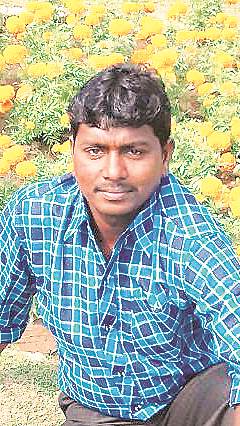 Wearing his “lucky” blue check shirt, 36-year-old Budra took his exams with 108 other candidates, some serving with the district police force.
Wearing his “lucky” blue check shirt, 36-year-old Budra took his exams with 108 other candidates, some serving with the district police force.
A former head of the Malkangiri unit of the CPI (M-L), Budra is an accused in roughly 10 cases, including kidnapping, assault and burning of road construction equipment, as well as the 2008 killing of 17 members of Odisha’s Special Operations Group in an ambush on the Kalimela-Motu road in Malkangiri. In 2016, he quit the CPI (Maoist), attributing the decision to frequent accusations by Andhra cadre that he had been unfairly promoted over others.
In 2017, Budra and nearly 30 others enrolled for the entrance test as part of the Malkangiri police’s ‘Mission Education’ initiative for former LWEs. An April 2018 Home Ministry report lists Malkangiri as one of the two most-affected LWE districts in the state, alongside Koraput. In May, Odisha DGP R P Sharma had announced that ongoing anti-Maoist operations in Malkangiri, Koraput, Kandhamal, Balangir, Nuapada, and Rayagada would be intensified.

Malkangiri District SP Jagmohan Meena says, “Upon hearing that the BPP allows people to straightaway get into a bachelors programme, I started a batch of 50 students from among ex-Naxals in the district and the militias supporting them. The numbers swelled to 150 as ordinary locals joined the group. We conducted classes for them in the district police office. Some police officers, including myself, taught them.”
Budra and the others received coaching two-three times a week, for six months. In addition, the district police arranged training for the men in tailoring and driving, to provide them employment while they studied. Some of the former Maoists now tailor all the uniforms for the local police.
“My students are bright and enthusiastic, but we had to work hard to get them to learn systematically. Teaching them how to take notes was the foremost challenge,” says Meena, adding that the initiative was separate from the support system provided by the state’s Revised Rehabilitation-cum-Resettlement Scheme for ex-Maoists, introduced in 2016, which largely provides financial assistance.
Budra did most of his preparation for the test with ex-Maoist Bima Sodi, alias Rushi. Rushi, 26, who was with the CPI (Maoist) for seven years, quit in 2014. “I have been living largely off the Rs 4 lakh I received upon surrendering and do odd jobs,” Sodi says.
Should Budra, a member of Malkangiri’s Gotti Koya tribal community, be admitted to the bachelors degree programme, he would be the first in his native village of Parsanpalli in Podia block to study beyond school. The literacy rate in the block stands at 29 per cent, as per Census 2011, against an all-Odisha rate of 73 per cent.
Continuing his education is also important for Budra at another, more personal level. Recalling how he became a Maoist, Budra says their village school didn’t have any teachers. One day in 2000, he and a few friends beat up the local block development officer and school inspector, for remaining “apathetic to our repeated demands”. “I was advised to go underground after FIRs were lodged. In 2002, I joined the CPI(ML).”
He was in the Kalimela unit, and given the nickname Sukhdev. A year later, he fell in love and married a woman cadre serving in the Baipariguda (Koraput) unit. He says he worked under Andhra Odisha Border region leader Akkiraju Haragopal, widely known as ‘RK’, and rose quickly through the ranks.
Talking about the 2008 killing of the 17 Odisha Special Operations Group men, Budra says, “Trees were felled on the road to stop the vehicle carrying policemen. An explosion did not do much damage. But when the vehicle overturned, security personnel came out and there was a gunfight.”
However, he denies being “directly involved”, and says he was on the other side of a “ghati (mountain range)” to provide cover fire to the attackers and ensure that no unexpected vehicles entered the scene.
Meena says they have no reason to doubt his admission “because he has been cooperative since his surrender”. “In any case, whatever he says he has done, still makes him complicit (in the attack).” The District SP adds that other cases against Budra too await trial in courts, as per the policy regarding surrendered Maoists facing “particularly heinous offences”.
After Budra surrendered, his wife Rukmini too gave up arms. The couple say they continue to face threat from Maoists, and Budra says he has received four letters from his former organisation on his “betrayal”. While they built a house from the Rs 9 lakh they received from the state government on surrendering, Budra and Rukmini continue to stay in a two-room house in the police colony in Malkangiri for security reasons, and make do by working as sharecroppers on fields of big farmers.
Budra says he rarely visits his mother and brother, and has not laid any claim to the family’s 15 acres that his brother now tills. Evasive about his own family, he is more enthusiastic about Rukmini’s. “Her parents are dead, but her only sister, who is married, is on very good terms with us,” he says.
Apr 26: Latest News
- 01
- 02
- 03
- 04
- 05











